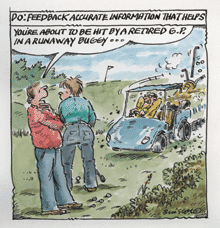How to teach your wife to drive
In the first of a new series Peter Hudson reveals the best way to coach your wife (or partner) to play golf and maintain your marriage (or relationship).

| |
|
For example, if your partner wants to play sport, get fit or make new friends, these reasons will keep her sticking at it. But if she’s merely playing to keep you happy, your plan is most likely doomed.
If, for instance, you want to teach/coach your wife to drive a golf club, make your initial introductions by watching a video or DVD together of women making great swings.
Encourage her to imitate what she has seen and give positive feedback on her early attempts. Stand face-to face and swing a club with her, encourage her to swing at an identical smooth, rhythmical tempo - as if in a mirror.
Never tell her how far away her swing is from perfection or the image on the video.
Once she has successfully clipped a tee peg consistently, allow her to make attempt to make contact with a teed up ball.
Encourage her to keep a specific target in mind. It’s important for a beginner that their goal is not to hit the ball perfectly but to hit it to a specific place.
It’s also important not to have too high an expectancy level of achieving that goal. Allow her to enjoy that first strike of the ball as a memorable one so she maintains her appetite for the game and will keep coming back for more.
I have found through coaching hundreds of new golfers that accurate and positive information must be given.
It’s better to say: "You’ll have more control if you hold the club like this," rather than "don’t hold the club like that!"
Encourage without being patronising.
Telling your pupil: "You showed me you have a real talent for hitting good shots today," rather than: "Don’t worry. Everyone hits the ball eventually."
And never get technical. Golf is crammed with jargon, which to a beginner is meaningless and at worst boring.
Telling your pupil, "listen for the swish the club makes through the air," is far better than advising them: "You’re decelerating through the ball."
Accentuate the positive.
It also helps to remember that women get different a different buzz out of golf compared to the male of the species.
Have you ever see two women on a driving range pull out their drivers and see who can hit the ball the furthest?
Women are more mutually supportive than competitive. And is you get the early coaching correct you could find you’ve trained your No.1 fan to share your love of the sport and be much more sympathetic and understanding to its highs and lows.
In a nutshell
Do:
Give accurate positive feedback
Encouraging without being patronising
Practice on warm, pleasant days with as much privacy as possible
Don’t:
Tell your pupil what to do
Tell her what she’s done wrong
Get technical or use jargon
Never raise your voice other than with enthusiasm and excitement
Next time: How a lesson for yourself should be constructed to guarantee improvement while maximising your enjoyment and sense of achievement.


